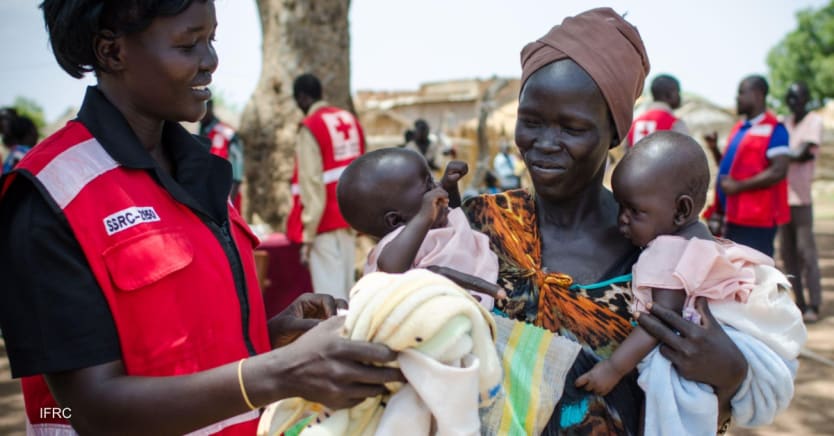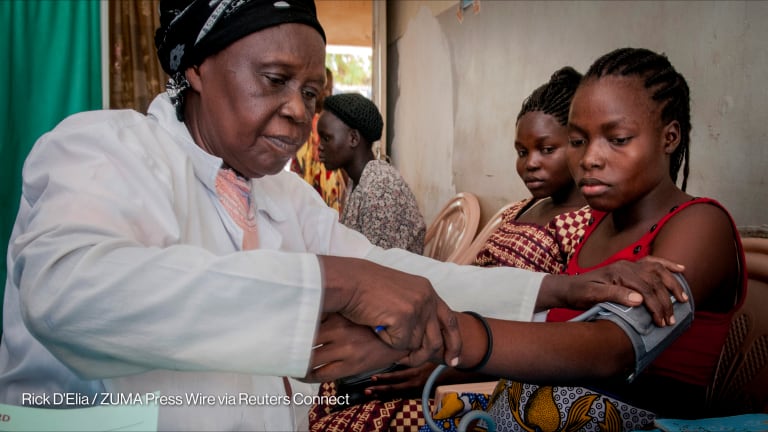Opinion: Together we must end the maternal and newborn health crisis

Globally, four newborn babies die every minute. And every two minutes, a woman dies during pregnancy or childbirth. These statistics are shocking and unacceptable. They represent too many lives lost, many of which are entirely preventable. Solutions exist to end these deaths. Decisive action is needed to change this.
Despite the United Nations’ Sustainable Development Goals inspiring action to reduce maternal mortality and end preventable deaths of newborns, progress has alarmingly stalled. With only six years to the deadline of achieving the SDGs, essential maternal and newborn health care must be prioritized if the lives of mothers and newborns are to be saved.
Pregnant women, mothers, and newborns are especially at risk in humanitarian crises. Weakened health care systems and depleted essential health resources contribute to staggeringly high rates of maternal and newborn deaths. Some 64% of maternal deaths and 50% of newborn deaths occur in the 29 countries identified by the World Health Organization as being affected by humanitarian crises. Governments, NGOs, donors, development agencies, and the private sector must come together to end all preventable deaths, including those in humanitarian settings.
At this year’s World Health Assembly, a resolution was passed committing to expedite efforts in reducing maternal, newborn, and child mortality. To support this, we hosted a roundtable of representatives from across the maternal and newborn health community, who have the ability and influence to deliver change, to drive a path forward to reduce maternal and newborn death, focusing on humanitarian crisis settings.
The discussions brought to light that many of the solutions needed to reduce these deaths are already available, even in humanitarian crisis settings, such as:
• The postpartum hemorrhage, or PPH, bundle — a set of recommended interventions which can manage this leading cause of maternal death, including usage of heat-stable Carbetocin Ferring, a medicine which is indicated for the prevention of PPH and remains stable for up to four years if stored below 30 degrees Celsius (approved storage conditions).
• The newborn care bundle — evidence-based guidelines to manage complications and reduce newborn deaths.
• Midwifery models of care — best practice health care service models for midwives.
Now, the global community needs to strengthen efforts to increase the speed of implementation, access, and investment for these evidence-based interventions and services.
Alongside this key point, other areas of discussion stood out:
1. Be proactively prepared, rather than reactive
Health care systems often tend to be reactive, addressing immediate issues as they arise. There is a pressing need to shift toward a mindset of preparedness, especially in a world increasingly vulnerable to conflicts and crises. By strengthening health care infrastructure and establishing services, we can build resilient health systems capable of withstanding climate and humanitarian emergencies. This proactive approach ensures continuity of care, particularly for women and children.
Early engagement with local organizations and community leaders ensures that interventions are culturally appropriate, sustainable, and meet the needs of those most affected. Additionally, planning must include the development of referral pathways to ensure that patients can efficiently access the care they need, even in complex and challenging environments. Conducting humanitarian assessments and health facility surveys helps establish baseline data and identify gaps, allowing for timely interventions before crises escalate.
2. Greater capacity must be established in national health systems
To support resilient and prepared health systems, engaging with community and health care stakeholders, such as midwives, is essential. Trained health care professionals are critical to the survival of women and newborns. They can provide care in all contexts, especially when health systems become nonfunctional. It is vital that health care professionals and midwives are trained and deployed effectively as they can advocate for and implement services in the most challenging circumstances.
3. Partnerships can bring vital expertise and resources
Preparedness, building resilience and capacity, and access to evidence-based interventions can be facilitated effectively by working together. An example of a public-private partnership bringing much-needed interventions to low-resource settings is Ferring’s Project Family: Safe Birth Commitment, which provides not-for-profit heat-stable Carbetocin Ferring for the prevention of PPH to low- and lower-middle-income countries, including in many humanitarian settings.
Coordination across maternal and newborn health is vital, as diverse stakeholders bring unique skills, resources, and perspectives that can collectively address the complex challenges faced by health care systems.
When working together, it is also important to consider the whole arc of women’s health, from sexual reproductive health, family planning, and pregnancy services to labor, delivery, postnatal care, and child health. We need to assess existing work to understand how to foster unique and critical partnerships, remove siloes and thereby reduce maternal, newborn, and child deaths together. The World Economic Forum’s Global Alliance for Women’s Health launched this year will assist with doing just this — working across sectors to put women’s health on the global agenda, unlocking investment, and advancing women’s health research and innovation.
4. Resolutions for change are important, but specifics for crisis settings must not be forgotten
The WHA resolution passed this year is a critical driver for change. Now, we need to ensure that the right support is in place to deliver on its commitments, particularly in humanitarian crisis settings. These require a greater emphasis on capacity building, emergency care systems, and the provision of medical surge services for women and children. We must not forget the nuanced requirements of such environments.
5. While urgent action is needed, we should remain optimistic as progress is being made
The collaboration seen at our WHA roundtable put a spotlight on the important work already happening and highlighted the steps needed to protect mothers and newborns in humanitarian crises.
To the global maternal, newborn, and child health community, let’s work together to reduce maternal, newborn, and child mortality. Regular monitoring of mortality rates is needed to track progress against the resolution, especially in humanitarian crises where the most vulnerable live.
As the U.N. General Assembly gets underway, the focus turns to how we mobilize and utilize the evidence-based solutions already available. At WHA, the deputy minister of health in Sierra Leone, Dr. Charles Senessie, expressed how declaring a national emergency within Sierra Leone has helped accelerate action for maternal, newborn, and child health by dedicating the country’s Ministry of Health resources to the issue. Other governments must urgently prioritize maternal and newborn health and drive action towards implementing high-impact interventions as a priority. Discussions and strategies must become lifesaving actions.
Watch the full roundtable here.
Search for articles
Most Read
- 1
- 2
- 3
- 4
- 5










